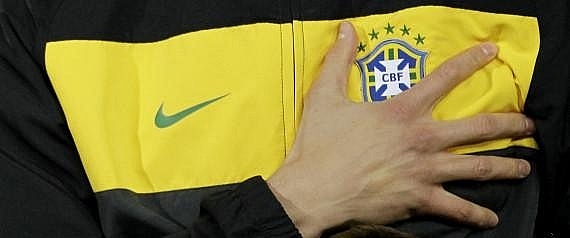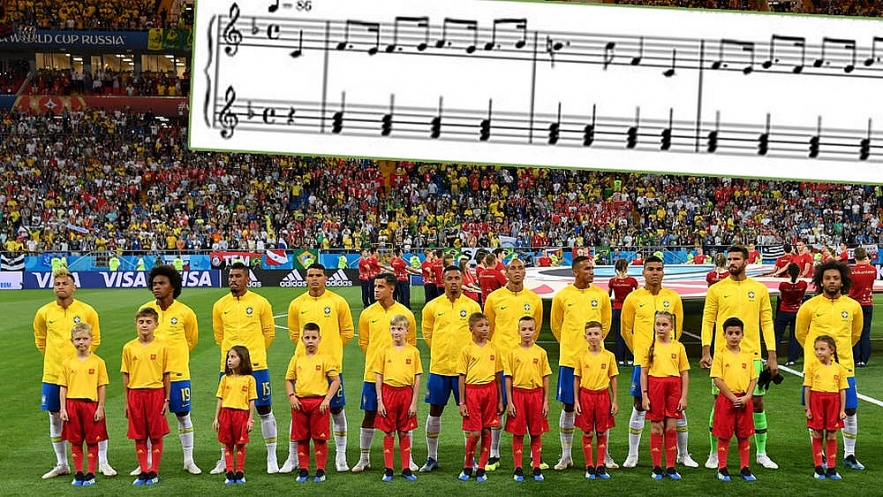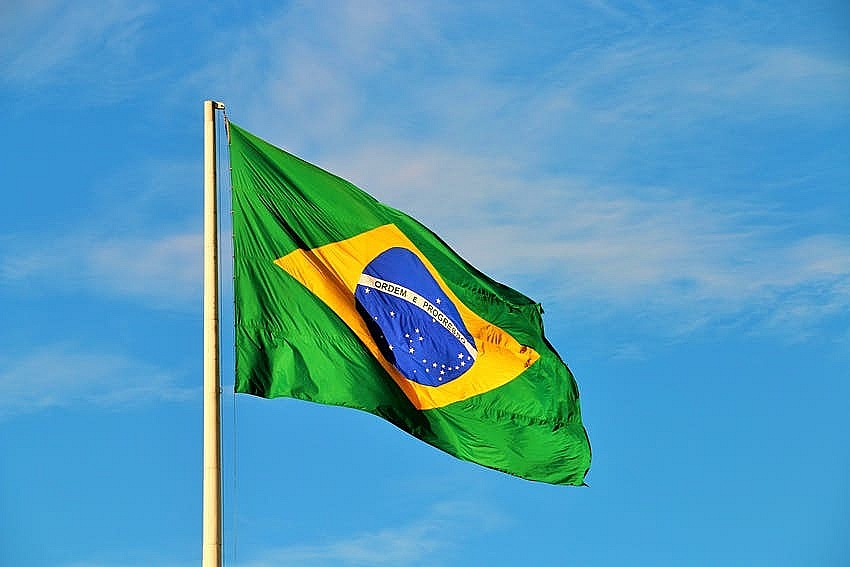Brazil National Anthem: Full Lyrics In Portuguese and English, Why Shortened At World Cup
 Top 10 Most Handsome Men in Brazil - Updated Top 10 Most Handsome Men in Brazil - Updated |
 7 Biggest & Best Shopping Malls For Foreigner in Rio De Janeiro - Brazil 7 Biggest & Best Shopping Malls For Foreigner in Rio De Janeiro - Brazil |
 |
| What Is National Anthem Of Brazil: History, Lyrics In Portuguese and English, Why Shortened At World Cup. Photo Babbel |
| Contents |
When was Brazil’s national anthem composed?
In the 1830s, the public was introduced to "The Brazilian National Anthem" (Hino Nacional Brasileiro). The current form was accepted on September 6, 1922, after several revisions throughout the years. The Brazilian people say their national anthem is full of positive energy and radiates warmth.
Who composed Brazil’s national anthem?
Original music by Francisco Manuel da Silva from 1831; current words by Joaquim Osorio Duque Estrada, penned in 1922. In the years before its renaming as "April 7 Hymn" in 1922, the lines commemorated Pedro I's abdication and the accession of Pedro II, then five years old, as Emperor of Brazil.
| Perhaps it’s because the national anthem was written by a poet, that’s why many Brazilians claim that the words to this beautiful song are not a walk in the park to comprehend. The main aspect of the Brazilian National Anthem is that the singer declares his or her love for Brazil and its citizens. The citizens are described as free children living on a giant motherland. |
The Brazilian people only recalled the piece when they celebrated Pedro I's abdication in April 1831, hence it had a limited audience. The song, written by Ovdio Saraiva, has become known as the "Anthem of April 7th" because to its stirring lyrics.
Ten years later, the anthem, now appropriately titled "Coronation Anthem," would be performed at Emperor Pedro II's coronation ceremonies. Thus, in 1869, the theme of a masterful piece, the "Fantasy on the Brazilian Anthem," composed and played at a soirée in the Imperial Palace by the celebrated American composer and pianist Louis Moreau Gottschalk, who had already consecrated it by tradition as the Brazilian National Anthem despite its lack of formal recognition.
By the time the Republic was established in 1889, radical Brazilians wanted a new national anthem because they saw the previous one as a holdover from the Empire. In January 1890, a competition was held to select a new national anthem, and 29 composers participated. Despite the efforts of numerous citizens and elected officials to have the old anthem preserved, Brazilian President Deodoro da Fonseca swiftly decided that the "Proclamation of the Republic Anthem" would serve as the nation's new national anthem.
The winning composition by Leopoldo Miguez and José Joaquim Medeiros e Albuquerque was dubbed the "Proclamation of the Republic Anthem," while the piece by Francisco Manuel da Silva was kept as the "National Anthem" by statute no 171 enacted on January, 20th, 1890.
 |
| Photo aboutBrasil |
Yet, the previous lyrics didn’t suit the new political standing as a Republic. This condition would stay overlooked until July 1909, when the government established a fresh contest to determine the new lyrics. Joaquim Osório Duque Estrada’s (1870/1927) poem won the contest, but would still await several years to be formally designated the text of the “Brazilian National Anthem”, by the statute n°15.671, of June, 9, 1922, the day before the Independence Centenary and 99 years after the composition’s inception. Francisco Manuel died five years before the birth of his lover Osório Duque Estrada.
The musical style of the Brazilian national anthem is related to early Italian Romantic music, comparable to composers such as Gioachino Rossini.
Before the National Anthem came to be, there was an Independence Anthem. It was prepared by emperor Pedro I and was utilized until he was deposed in office in 1831. The ironic thing was, it was first sung six days after he was dismissed from power, sort of like a farewell song. The lyrics to this Independence Anthem even featured comments portraying Portuguese imperialists as demons.
READ MORE: Top 23 Facts about Brazils You (Probably) Didn't Know
Why do they not sing the full anthem at international sporting events like the World Cup and Olympics?
 |
| Photo classicfm |
The Brazilian national anthem contains two stanzas but in most sporting events, like the World Cup, only the first is sung. Partly due to its length, it is also shortened because the players are not formally singing the anthem in front of a microphone. The Brazilian law specifies that only one chorus can be sung in instrumental performances.
Portuguese Lyrics of Brazil’s National Anthem
Verse One:
Ouviram do Ipiranga as margens plácidas /
De um povo heroico o brado retumbante, /
E o sol da Liberdade, em raios fúlgidos, /
Brilhou no céu da Pátria nesse instante. /
Se o penhor dessa igualdade /
Conseguimos conquistar com braço forte, /
Em teu seio, ó Liberdade, /
Desafia o nosso peito a própria morte! /
Ó Pátria amada, /
Idolatrada, /
Salve! Salve! /
Brasil, um sonho intenso, um raio vívido, /
De amor e de esperança à terra desce, /
Se em teu formoso céu, risonho e límpido, /
A imagem do Cruzeiro resplandece. /
Gigante pela própria natureza, /
És belo, és forte, impávido colosso, /
E o teu futuro espelha essa grandeza. /
Terra adorada /
Entre outras mil /
És tu, Brasil, /
Ó Pátria amada! /
Dos filhos deste solo /
És mãe gentil, /
Pátria amada, /
Brasil!
Verse Two:
Deitado eternamente em berço esplêndido, /
Ao som do mar e à luz do céu profundo, /
Fulguras, ó Brasil, florão da América, /
Iluminado ao sol do Novo Mundo! /
Do que a terra mais garrida /
Teus risonhos, lindos campos têm mais flores, /
"Nossos bosques têm mais vida", /
"Nossa vida" no teu seio "mais amores". (*) /
Ó Pátria amada, /
Idolatrada, /
Salve! Salve! /
Brasil, de amor eterno seja símbolo /
O lábaro que ostentas estrelado, /
E diga o verde-louro dessa flâmula /
― Paz no futuro e glória no passado. /
Mas se ergues da justiça a clava forte, /
Verás que um filho teu não foge à luta, /
Nem teme, quem te adora, a própria morte. /
Terra adorada /
Entre outras mil /
És tu, Brasil, /
Ó Pátria amada! /
Dos filhos deste solo /
És mãe gentil, /
Pátria amada, /
Brasil!
Lyrics in English
The peaceful banks of the Ipiranga
Heard the resounding cry of an heroic people,
And the dazzling rays of the sun of Liberty
Bathed our country in their brilliant light.
If with strong arm we have succeeded
In winning a pledge of equality,
In thy bosom, O Liberty,
Our hearts will defy death itself!
O adored Fatherland,
Cherished and revered,
All hail! All Hail!
Brazil, a dream sublime, vivid ray of love and hope to earth descends,
Where in your clear, pure, beauteous skies
The image of the Southern Cross shines forth.
O country vast by nature,
Fair and strong, brave and colossus,
Thy future mirrors this thy greatness.
O land adored
Above all others,
‘Tis thee Brazil,
Beloved Fatherland!
Thou art the gentle mother of the children of this soil,
Beloved land,
Brazil!
Laid out eternally in the splendour of nature,
In the sound of the sea and the light of heaven,
may thou shine, O Brazil, flower of America,
Illumined by the sun of the New World!
More flowers put forth in thy fair, smiling fields
Than the in the most gorgeously reputed lands;
“More life is to be found in the groves”,
“More love in our lives” in thy embrace.
O adored Fatherland,
Cherished and revered,
All Hail!
All Hail!
May the star-scattered banner flown by thee,
Brazil, become the symbol of eternal love,
And may the green-gold flag proclaim always
– Peace in the future and glory in the past –
But if the mighty sword of justice drawn forth,
You will perceive your children, who adore you,
neither fear to fight,
nor flee from death itself.
O land adored
Above all others,
‘Tis thee Brazil,
Beloved Fatherland!
Thou art the gentle mother of the children of this soil,
Beloved land,
Brazil!
Brazil Flag: Symbol of Order & Progress
 |
| Photo lonely planet |
Brazil's national flag is green with a huge yellow diamond in the center. There are five white stars of varying sizes and a white stripe inside the diamond. This white banner reads, "Ordem e Progresso" (Order and Progress) in green text. Auriverde, Portuguese for "(of) Gold and Green," is another name for the Brazilian flag.
The Brazilian flag takes its colors and basic design elements from the flag of the Brazilian Empire, however the blue globe with stars and the motto have since replaced the imperial insignia. On 19 November 1889, just four days after Brazil formally became a republic, the current flag was established. There have been a few tweaks since then, most recently on May 11th, 1992, when 4 additional stars were added.
Colours
The Brazilian flag was designed with each color representing something important to the Brazilian people. Gold is just one example of Brazil's natural bounty, and the color yellow stands for all of it. The Amazon jungle, the Atlantic jungle, and the Pantanal are all depicted in green to represent their unique vegetation and animals.
By the way, the flag of the Brazilian Empire used these colors for a different symbolic purpose. Blue and white represent the Virgin Mary, representing the widespread Catholicism in Brazil.
Slogan
The word 'Ordem e Progresso' is the best known motto of Positivism. Philosopher Auguste Comte said, "L'amour et l'ordre pour principe pour base; pour le progrès en définitive" ("Love as a principle and order as the basis; progress the goal").
Several oligarchic and authoritarian administrations in Latin America between 1870 and 1930 used the notion of "Order and Development" to legitimize their rule. They agreed that democracy is superior to other systems of administration, but that a well-functioning democracy requires a well-informed and prosperous populace.
Firmament
The constellations depicted on the Brazilian flag include the Southern Cross, a symbol of the southern hemisphere, and several more. As the Brazilian Empire was overthrown and replaced with a republic on November 15, 1889, the stars (constellations) seen from Rio de Janeiro were depicted on the country's flag.
It wasn't until years after the declaration of the republic that the stars on the American flag came to symbolize the individual states. The flag was later altered to feature 21 stars instead of 20. Since then, each star has stood for a different state. Sigma Octantis, a star near the celestial south pole, is the Federal District's "own" star because it can be seen virtually everywhere in the United States throughout the entire year.
Adding a star to the Brazilian flag was a common practice whenever the country gained new states by slicing up larger ones. Since 1992, when it was last updated, the Brazilian flag has had its current arrangement of 27 stars.
 7 Biggest & Best Shopping Malls For Foreigner in Rio De Janeiro - Brazil 7 Biggest & Best Shopping Malls For Foreigner in Rio De Janeiro - Brazil Brazil has some of the hottest shopping destinations in all of South America. Check out the list of top 10 biggest and best shopping malls ... |
 Top 10 Most Handsome Men in Brazil - Updated Top 10 Most Handsome Men in Brazil - Updated Especially surprising is the eternal positive, incredible gestures and expressions of Brazilians, while the men are famous for great charm. |
 Top 10 Traditional Dishes You Must Try in Brazil Top 10 Traditional Dishes You Must Try in Brazil Have a plan to travel to Brazil this summer vacation? Check out the top 10 traditional Brazilian dishes you must try below! |
























